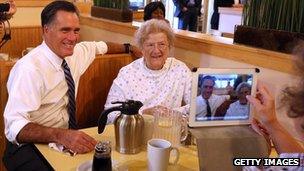Every day is election day
- Published
- comments

The final push for each candidate goes back to the retail politics of the early primaries
Four letters in burnished steel are stuck to the sort of bare metal rack that you can see in any warehouse in America.
The sign reads "JOBS". The backdrop to Mitt Romney's first rally in Ohio today is an artful suggestion of stripped-down, industrial virtue, made in the USA.
When Romney appears, he talks big. Big changes. Big challenges. Big choices. A strategist tells me it is a deliberate contrast with what they say is President Barack Obama's "small vision for the future".
Before he appears, a prominent Romney surrogate, Senator Rob Portman, urges everyone at the rally to vote as soon as it ends. Now. Today.
If those committed enough to come to a rally have already voted, they can spend their time getting other people to the polls or persuading them to vote, he says.
In this, if only this, Republicans agree with President Obama, who votes today.
As one strategist put it, "every day is election day."
Early ground game
There has been a lot of talk of the ground game in this election. In the past that meant sending buses for grannies on polling day - finding out who would like to vote for you and making sure they have transport for the big day.
Finding out who is sympathetic, apathetic, reluctant or persuadable is still vital. But widespread early voting, as well as postal voting, changes the game.
Once a person says in principle they would like to vote for your candidate, you can check that they have gone to vote at all. If they haven't, you can check the next day. And the next. Until they get so fed up they do vote.
As an added bonus no last-minute blunder by your candidate allows them to change their mind.
This is why it is so important. I've repeatedly said in the end this election will all come down to turnout.
Think about what Mr Obama did in 2008: he persuaded a lot of people who didn't usually bother to vote, to vote for him. Without those extra votes he would have won, but not have won big.
Some commentators say that it isn't really that tight a race - Mr Obama is still ahead in the swing states that matter. That's true. But only by a tiny margin, well within a margin of error.
Mr Romney's team are trying to persuade disappointed Obama supporters that their man isn't worth giving another chance, and maybe theirs is.
A Romney strategist told me they were hoping for "molt" - to me a new and novel term for switchers.
So Mr Obama needs to get as many of those half-hearted 2008 voters in the bag as possible. If possible before polling day.